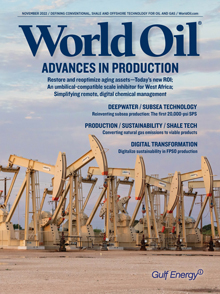Issue: November 2022
Columns
A mere 400 petroleum engineers are expected to graduate from U.S. universities in 2022, representing an 83% decline from the 2017 peak. The number of incoming students suggest that trend is not likely to change significantly anytime soon. What can the industry to tackle the challenge of attracting and retaining desperately needed technical talent?
Oil and gas operators are uniquely positioned to not only provide the world’s energy but also provide the infrastructure needed to make carbon storage a reality.
The issue today is not so much the what, but who controls energy, and who benefits from energy policy. The battle in the fossil fuel industry is not technical nor resource-bound, but about dominating ideology.
Politics and regulations, particularly on the federal level, affect so much of the upstream industry’s health and performance, which can lead to a muddled mess in future developments.
Need to achieve net zero? Big problem. But as demonstrated by an unprecedented list of remarkable technological achievements and recent initiatives, it’s clear our industry is not the problem. On the contrary, we are integral to the solution.
With cooperation from local/state governments and landowners, water recycling can increase exponentially in future operations.
Special Focus: Advances in Production
Digitalized machine learning and data analytics elevate values of mature fields
Digital technology and smart devices have fundamentally changed the way that we manage our lives. These advances are now improving operational efficiency in the chemical management sector of the oil and gas industry.
Two NETL-funded projects are working to develop efficient natural gas conversion technologies that produce marketable solids and liquids to mitigate methane emissions into the atmosphere.
Digital technologies and a proactive design approach can help reduce containment-loss risks and improve safety in floating production vessels.
Chemical scale inhibitors are an essential component in oilfield management. Selecting the appropriate chemical for the conditions and mode of application is critical to successful treatment. As operators encounter more challenging scaling environments, the need to develop synergistic scale inhibitor blends is more crucial.
Features
A new, 20,000-psi, subsea production system has been developed and is now being manufactured and factory-tested for installation in the Gulf of Mexico. The system was rigorously qualified by an independent third party to ensure all previous technology gaps were addressed. This story explains the technology’s development.
Part 2 of this three-part series examines the full lifecycle operations simulations performed using BMT’s SLOOP event domain software, to compare subsea (wet tree) and dry tree concepts. This article argues for using a permanently moored dry tree concept with key performance statistics of DP MODUs and platform rigs.
The recovery of U.S. upstream activity is being slowed by high costs for equipment and services, personnel issues, and supply chain shortages, including spare parts.
IA helps by driving innovation, filling some skills gaps for engineers, and enhancing data usage and operational efficiency.
Resources
Crude prices rose in October despite concerns that demand in virus-hit China could slip, and looming European sanctions would further restrict Russian supply.



